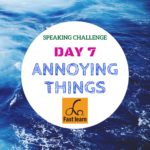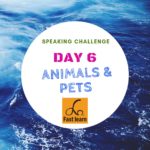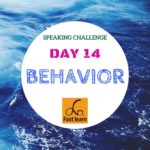Animals & Pets
1. Are there animal rights groups where you live?
No, I guess. Apart from laws about wild animal protection, especially laws to facilitate the operation of natural reserves (khu bảo tồn thiên nhiên) to protect endangered animals, (động vật có nguy cơ tuyệt chủng) I think animal rights are mainly for defending domestic animals. (vật nuôi trong nhà) And because there is almost no of such law enacted in Vietnam, it is hard to claim any group as animal right groups although sometimes I can hear of some animal rescue groups. (nhóm giải cứu động vật) They do have Youtube channels and Facebook fan pages, so they have really drawn some social attention.
2. What kind of animals do humans ride?
Horse, camels, donkey (con lừa) , mule (con la),
3. Are you afraid of snakes?
Of course yes, who isn’t? Snakes are so so unpredictable to me. I don’t know when they throw their bodies at me. The fear may be because I have never been bitten by any snake, so I am afraid of the unexpected feeling of getting the bitten part numb (tê) or swell up (sung lên). The snake bite can make the affected organ rot, (làm bộ phận bị cắn thối rửa) which leads to amputation (cưa tay, cưa chân) and disability. That thought really scares me to death.
4. Are you frightened of spiders?
Not really because I see spiders quite frequently in my life, and they are too small to scare me. You know, when I am confident that even when the spider charges at (nhảy xổ vào) me, I can still jump back to avoid the attack. If so, there is no need to worry when encountering (gặp phải) spiders.
5. Are your pet(s) healthy?
I use to keep a cat which died of kidney stones (sỏi thận) due to too much fish consumption. I still feel the guilt and blame myself for being so ignorant (thiếu hiểu biết) at that time. I should have diversified his diet rather than feeding him with his favourite food day in day out. I also keep a cat now, and the lesson in the past helps me to do a much better job in keeping a healthy cat.
6. Can you name some endangered species?
Rhinoceros, cougar (báo sư tử Mỹ), Bengal tiger, gray whale, polar bear
7. Do you consider yourself an animal lover?
Sure, to some certain extent. As long as the animal does not mess up my place every day, I guess I can share the house with them. I live to take care of dogs and cats in my free time. Whatever I can do for them like grooming, (vuốt, chải lông) giving them a bath, helping them get rid of ticks (bắt ve), or giving them anti-flea spray (xịt chống bọ chét), etc. , I will do for their physical and mental well-being.
8. Do you ever go bird watching?
No, I am not interested. Also, trekking to the natural habitat (môi trường sống) of beautiful birds takes too much time and effort for me to afford. So here I am, never have done and never will do bird watching.
9. Do you ever talk to your pet? If so, what do you say?
Sometimes I do talk to my cat, and the conversation is about advice and explanations for my punishment for him after he messes up my house.
10. Do you know someone who owns an unusual pet?
No, I don’t. And to tell the truth, I feel those who keep alligator, giant lizard, snakes, or big pigs as pet are eccentric (lập dị) . These are quite nasty (bẩn, ghê) and dangerous animals for me.
11. Do you think it is acceptable to test cosmetics on animals?
I can’t imagine what kind of cosmetics can be tested on animals. Perfume? Animals do not wear make-up do they? And testing perfume on monkeys? It sounds ridiculous because we cannot ask them whether or not they like it.
As regards toxic substances, (chất độc) the chemical synthesis (sự tổng hợp hóa chất) can tell whether or not it is dangerous already, and for sure they shouldn’t be applied on any living things. So why do we need to test cosmetics on animals? This issue really puzzles me J
12. How do you feel about the use of animals for medical research?
It is brutal and necessary at the same time. Testing medicines on animals may kill them. And the kill can be as massive as a massacre (thảm sát) of thousands, and millions of animals like rats, monkeys, and birds. However, it is necessary and humanitarian (nhân văn) also when the sacrifice of these tested subjects (những con vật thử nghiệm) can help save millions of lives of other animals and human beings. So I can say it is a necessary evil we need to do.
13. Do you think it is okay to eat meat?
It is completely alright to eat meat as the main source of protein, but recently there has been a movement (phong trào) of people shifting to have plant-based diet. Amazingly, some of them are high-performing athletes. The fact that eating plant is better than consuming is reverberated (nhắc đi nhắc lại) in the medical and nutritional fields for years, but not many can really change their diet by reducing meat consumption to substitute it with alternative (thay thế) plant-based food source, which is expected to be quite complex combinations of ingredients.
14. Is there any kind of meat you would not eat?
I stopped eating dog’s and cat’s meat more than 10 years ago because I can’t stand the feeling of guilt when helping consume the meat from dog’s and cat’s slaughterers. (tên đồ tể, người giết mổ) You know, the bond between those two pets with us is so close that they can be considered our friends or family members, so it is quite barbarian (dã man) to kill them for meat.
15. Do you think it is right to keep wild animals in a zoo?
This issue does have both positive and negative sides. It is right to keep them in captivity (nhốt, giam giữ) for educating people about them. Some fierce animals like tigers and lions can rarely be approached in the wild, so for millions of people to see them in real life with their own eyes, it is necessary to keep them behind bars in zoos. However, it is also an act of cruelty to some extent. Freedom means everything to us and we strip them of their freedom. (tước đoạt tự do của chúng) I am wondering if the solution to this can be eradicating (xóa bỏ) all the zoos and turning the artificial breeding facilities (cơ sở nhân giống nhân tạo) into zoos. Animals in these breeding programs are very close to their human care givers, and they will soon be released to the wild when they can afford to survive without human assistance. If so, no animals are permanently kept in zoos, but people can still enjoy their zoo trips.
16. Do you think it’s okay to free animals that have been in captivity all their lives? Why or why not?
This issue is not as simple as it may sound at first. On the surface, freeing animals to the wild seems beneficial for them, but actually that can kill them as well. When the adaptive competence (khả năng thích nghi) of wild animals is taken away from them after a long time in captivity, releasing them to the natural habitat can turn them into easy prey for other carnivores. (biến chúng thành con mồi cho loài ăn thịt khác)
17. Do you think people should buy and wear fur coats?
I always believe that it is selfish to have fur on our coats. It is about killing, skinning (lột da) animals and putting the fur on coats. When people have demand for fur coats, they create the need for killing animals for their fur. The idea is barbarous (dã man) at its core (từ cốt lõi) already without further explanation.
18. Have you ever been to a zoo? What animals did you see there?
Yes, quite some times. I see hippopotamuses (hà mã), porcupines (nhím), pythons (trăn), ostriches (đà điểu), chimpanzees (vượn), tiger, lions, elephants, etc.
19. Have you ever seen a dog that helps people, such as one to help a blind person?
I have seen on TV that some dogs are trained to be companions of blind people, they help those with vision impairment (khiếm thị) to navigate (đi lại) outside their homes. Also, I see some therapy dogs for patients of such health problems as Alzheimer’s disease or dementia. The intimacy these dogs give can have some healing effects for those patients.
20. How many birds do you know that can’t fly?
Penguin, ostrich, emu, peacock, 4 birds.
21. How many legs does a spider have? How about a squid?
A spider has 8 legs (and 2 fangs (nanh)); the squid has 2 tentacles (xúc tu) and 8 arms.
22. Pets are considered to be a burden to most of the city dwellers. To what extent do you agree?
It is completely right. It is no doubt that pets need care. They need their owners to spend time with them daily, which is sometimes too much of a demand for city dwellers with hectic days.(ngày bận rộn) Also, pets need their own toilet, which does not exist, so lots of cleaning up is also required. For dogs, walking them out once in a while is also a duty of their owners. Those things are time consuming,(tốn nhiều thời gian) and are certainly a burden for people in urban areas. However for people in the countryside, the only duty pet owners need to do is to feed them well.
23. What are the pros and cons of keeping a pet?
Advantages of keeping a pet includes
- having a companion (bạn đồng hành)
- learning patience and sympathy
- improving mental health
- increasing personal safety (dog barks when seeing strangers)
Disadvantages:
- responsibility for feeding, spending time with them, cleaning up their mess on a daily basis (hàng ngày)
- Pets can cause health hazard (nguy hiểm cho sức khỏe) for people who suffer from asthma (bệnh suyễn) and have fur allergy. (dị ứng lông động vật)
- It may cost a lot to have a pet, especially those expensive dogs that only eat special meals and nees high quality medical services.














